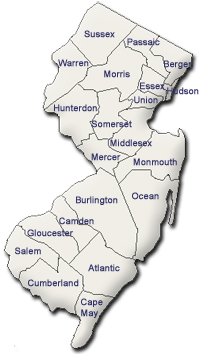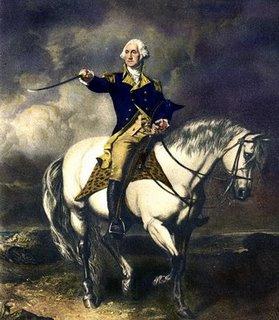Related Topics
The British Attack Philadelphia
Fighting in the Revolutionary War lasted eight years; for two years (June 1776 to June 1778) Philadelphia was the main military objective of the British.
Sights to See: The Outer Ring
There are many interesting places to visit in the exurban ring beyond Philadelphia, linked to the city by history rather than commerce.
Historical Motor Excursion North of Philadelphia
The narrow waist of New Jersey was the upper border of William Penn's vast land holdings, and the outer edge of Quaker influence. In 1776-77, Lord Howe made this strip the main highway of his attempt to subjugate the Colonies.
New Jersey (State of)
 The Garden State really has two different states of mind. The motto is Liberty and Prosperity.
The Garden State really has two different states of mind. The motto is Liberty and Prosperity.
Montgomery and Bucks Counties
The Philadelphia metropolitan region has five Pennsylvania counties, four New Jersey counties, one northern county in the state of Delaware. Here are the four Pennsylvania suburban ones.
Revolution in New Jersey
Early, brief but significant.
Disorderly Retreat: From Trenton Back to Perth Amboy

|
| George Washington on a Horse |
A week later, they got a bad jolt; Washington declined to play by their winter rules. At the Battle of Trenton, Washington was 44 years old, six feet four inches tall or more, a horseman and athlete of outstanding skill, and as the husband of the richest woman in Virginia, accustomed to housing, feeding, transporting and getting cooperation from two hundred slaves. All of those qualities may have been of some use in the battle. But after the Battle of Trenton, Washington also emerged as a remarkably bold and creative General. In the Battle of Trenton ca-----------------999999 seen the elements of audacity, timing and courage that were notable in Stonewall Jackson, George Patton -- Virginians, both -- the Normandy Invasion, and the Inchon Landing. He forged, if he did not create, the American military tradition of inspired risk-taking. And he did it with a collection of starving amateurs, up against the best Army in the world at the time. Probably without realizing it, his coming victory at Trenton also gave Benjamin Franklin in Paris a major enticement for the French King to support the American cause. Washington produced a significant achievement, but just to make sure, Franklin exaggerated it just as much as he could.
On December 21, Washington thought Howe was immediately going to sweep on through Trenton to Philadelphia. In a day or two, he saw that wasn't the plan, organized the famous re-crossing of Delaware in bad weather, and caught and captured a thousand Hessians with a three-pronged attack which cut off their retreat and made resistance useless. The main military feature of this attack was not Christmas drunkenness among the Hessians, but the fact that General Knox had somehow transported eighteen cannon to the occasion. Nowadays, the event is marked by a reenactment on Christmas Morning, although it took place on December 26, 1776. The timing did not have to do with religious observance, it had to do with hangovers. To the great disappointment of his troops, he made them abandon the great stores of booze in Trenton because a second detachment of Hessians was in nearby Bordentown, and meanwhile, he retreated back to the Pennsylvania side of the river. As might be imagined, Howe's Cornwallis promptly came charging down from New Brunswick to exact bitter vengeance. Instead of trying to rescue their comrades in Princeton, the Bordentown Hessians took off for New Brunswick. Defiantly, Washington taunted his enemies by again recrossing Delaware to the New Jersey side, put up fortifications, just waited for them to make something of it.
Well, that's the way it was meant to seem. On the night of January 2, the two armies were facing each other with about five thousand men on both sides, but with the British much better trained and equipped. The Americans had the advantage of not being exhausted by a fifty mile forced march, except for about a thousand who had been deployed forward to skirmish and delay the British advance with sniping from the bushes. The Americans made a great deal of noise and lit many bonfires behind their fortifications. But when they advanced the next morning, the British found out where the Americans really were -- by hearing distant cannon fire coming from Princeton, ten miles back toward the north.
Washington had slipped five thousand men wide around the enemy flank during the night and had taken a parallel country road to Princeton where he defeated a rear guard of British at the Battle of Princeton. An infuriated Cornwallis wheeled his army around in pursuit, and the race was on for the supplies left undefended in New Brunswick. Washington might have been able to get there first, except his men were too exhausted, and he was afraid to risk his long-run strategy, which was to avoid head-on collisions with the main British Army.
So Washington went into winter quarters in Morristown still further to the north, and thousands of British soldiers were thus bottled up in winter quarters in Perth Amboy and New Brunswick, where scurvy, lack of firewood and smallpox gave them a few months to consider their miscalculations. But the most important action of all was getting the news to Benjamin Franklin in Paris, to tell the French king of the victory. Franklin even dressed it up a little.
REFERENCES
| New Jersey in the American Revolution: Barbara J. Mitnick: ISBN-13: 978-0813540955 | Amazon |
Originally published: Friday, June 23, 2006; most-recently modified: Wednesday, May 22, 2019
| Posted by: Lizzie | Oct 27, 2006 1:13 PM |